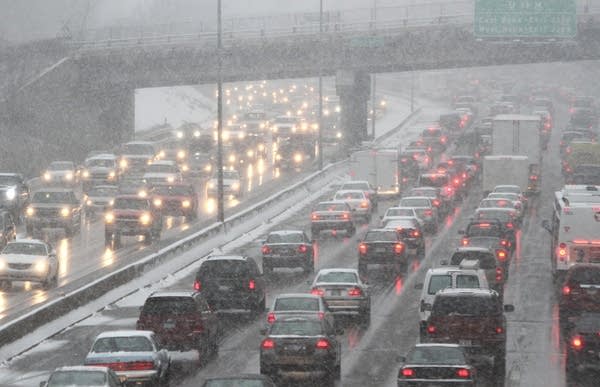America's crumbling transportation infrastructure
Go Deeper.
Create an account or log in to save stories.
Like this?
Thanks for liking this story! We have added it to a list of your favorite stories.

It's hard to claim that America's transportation system is in great shape. The American Society of Civil Engineers says the United States has a $3 trillion backlog on transportation projects and it costs drivers in traffic jam time, wear on cars and damage to the environment.
But how are we going to pay to improve it?
Emil Frankel, visiting scholar at the Bipartisan Policy Center, joined Kerri Miller on The Daily Circuit Wednesday.
"We have an aging, congested, deteriorated system," he said.
Turn Up Your Support
MPR News helps you turn down the noise and build shared understanding. Turn up your support for this public resource and keep trusted journalism accessible to all.
But one thing politicians can't seem to agree on: How to pay for upgrades.
Richard Geddes, associate professor in the Department of Policy Analysis and Management at Cornell University, also joined The Daily Circuit discussion.
"We have not always underfunded road repair in the country," Geddes said.
Taxes on gasoline have always been a strong source of funding for transportation infrastructure projects as long as there were more drivers using more gasoline, thus paying more taxes. That isn't the case anymore, Geddes said.
"The main [reason] in my view is the increasing fuel efficiency of vehicles, which means that people can drive more vehicle miles, but don't pay proportionately more in fuel taxes," he said.
So should we increase the gas tax? Geddes said it's a "political bomb to go out and advocate for an increase from the federal gas tax."
"At least part of the reason for that is people's lack of faith that the revenue from an increase from a gas tax would be spent wisely by Congress," he said.
Geddes referred to the 2005 highway bill, which included 6,371 earmarks and the notorious "bridge to nowhere" in Alaska.
Steve in St. Paul called into the show in support of paying more for his road usage.
"I'm actually a general contractor here in the Twin Cities, so I use the roads fairly regularly, much more than probably some people," he said. "Unfortunately I'm not able to create any commuting or sharing of vehicles because of the type of job that I do, but I'd be more than willing to pay for the cost of what I use."
Linda in Bemidji also called into the show and expressed concern about the extra cost to people in rural communities.
"An increase in the gas tax is kind of a disproportionate hit to rural people especially in little communities such as ours where we have very little investment in transportation," she said. "I think you drive further and you don't have the option of having a bus or any other type of public options there."
On Facebook, Marty Walsh suggested a better toll system.
"Highways inside cities should be flexible toll toll roads," Walsh wrote. "They serve no purpose other than to get people where they are going as fast as possible, and so having a price to make that happen is the best way to do it."
ASKED AND ANSWERED
Kerri Miller: It's kind of ironic isn't it though? We're getting more efficient and that means that it's having an effect on the roads and bridges that we are traveling on.
Richard Geddes: Right. That's right, Kerri. You used the term ironic. Mary Peters, the former U.S. Secretary of Transportation, used the term 'a policy at war with itself' because at one level we are encouraging people to drive more efficient cars I believe for very sound reasons, but on the other hand we rely on fossil fuel consumption in order to fund the infrastructure that those folks are driving on. So there really is very deep and profound tension between those two policies.
KERRI'S TAKEAWAY
People are willing to pay more for transportation infrastructure if they know their money is actually going to fixing the roads they use.
Video: What Would Frankel Tell Congress About Transportation?



